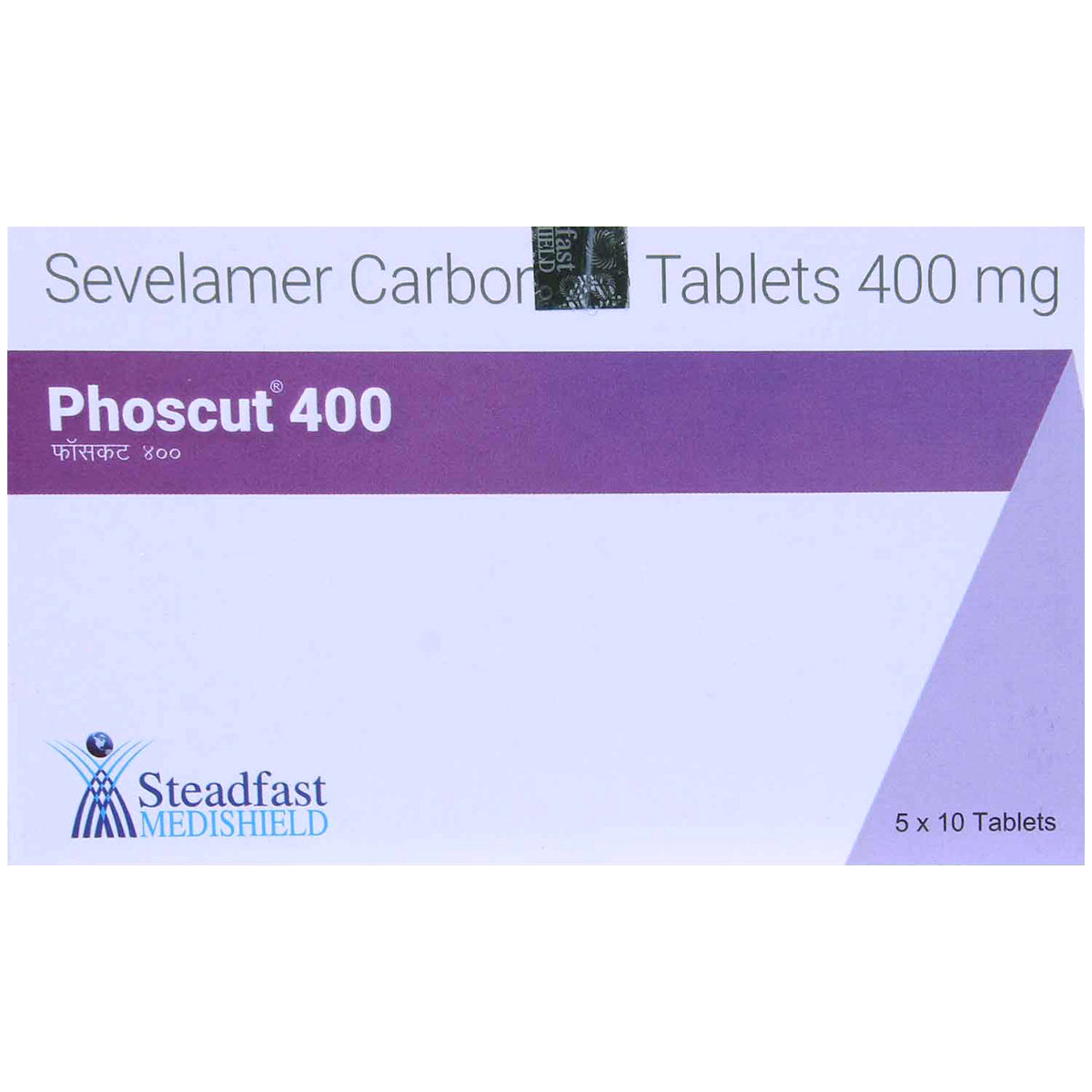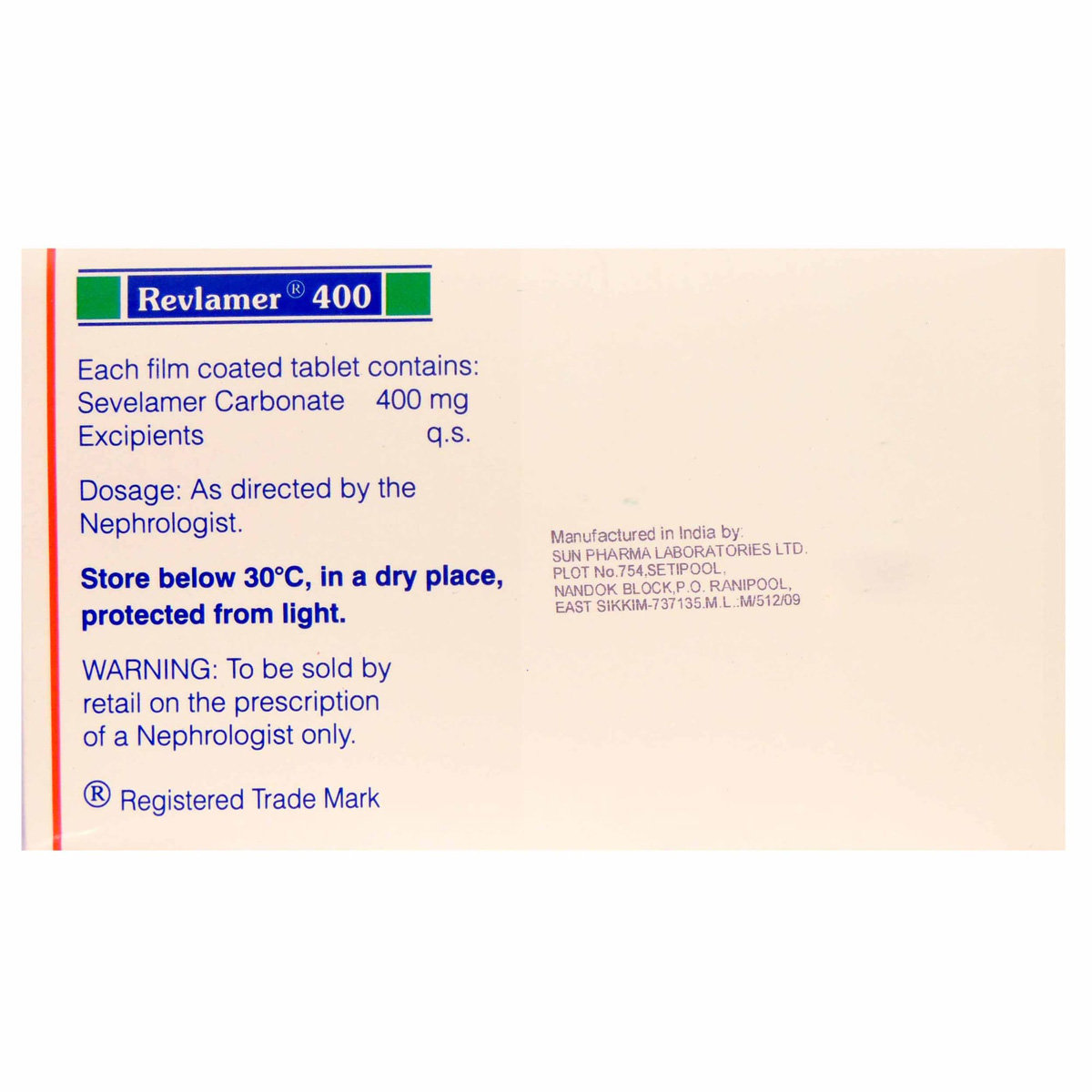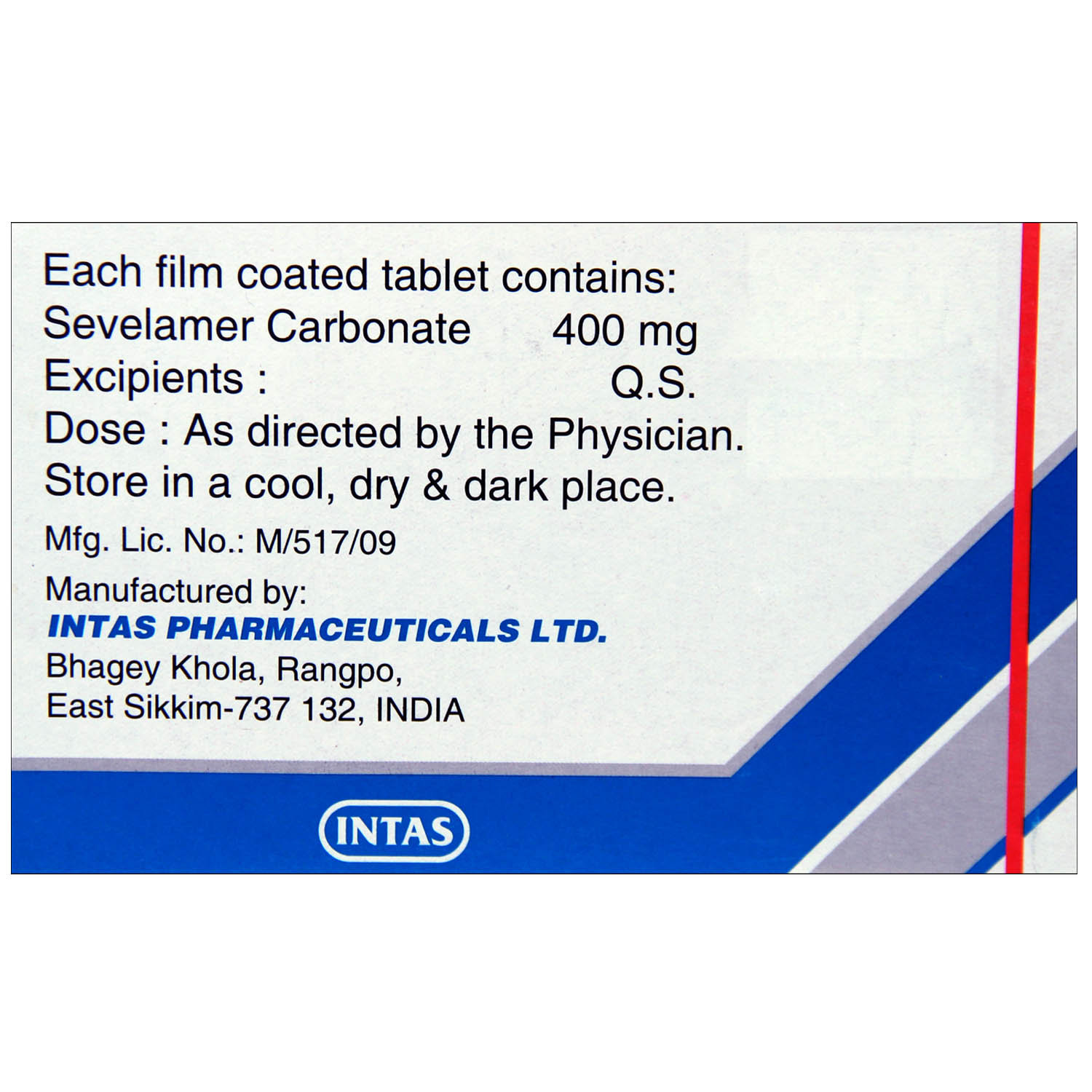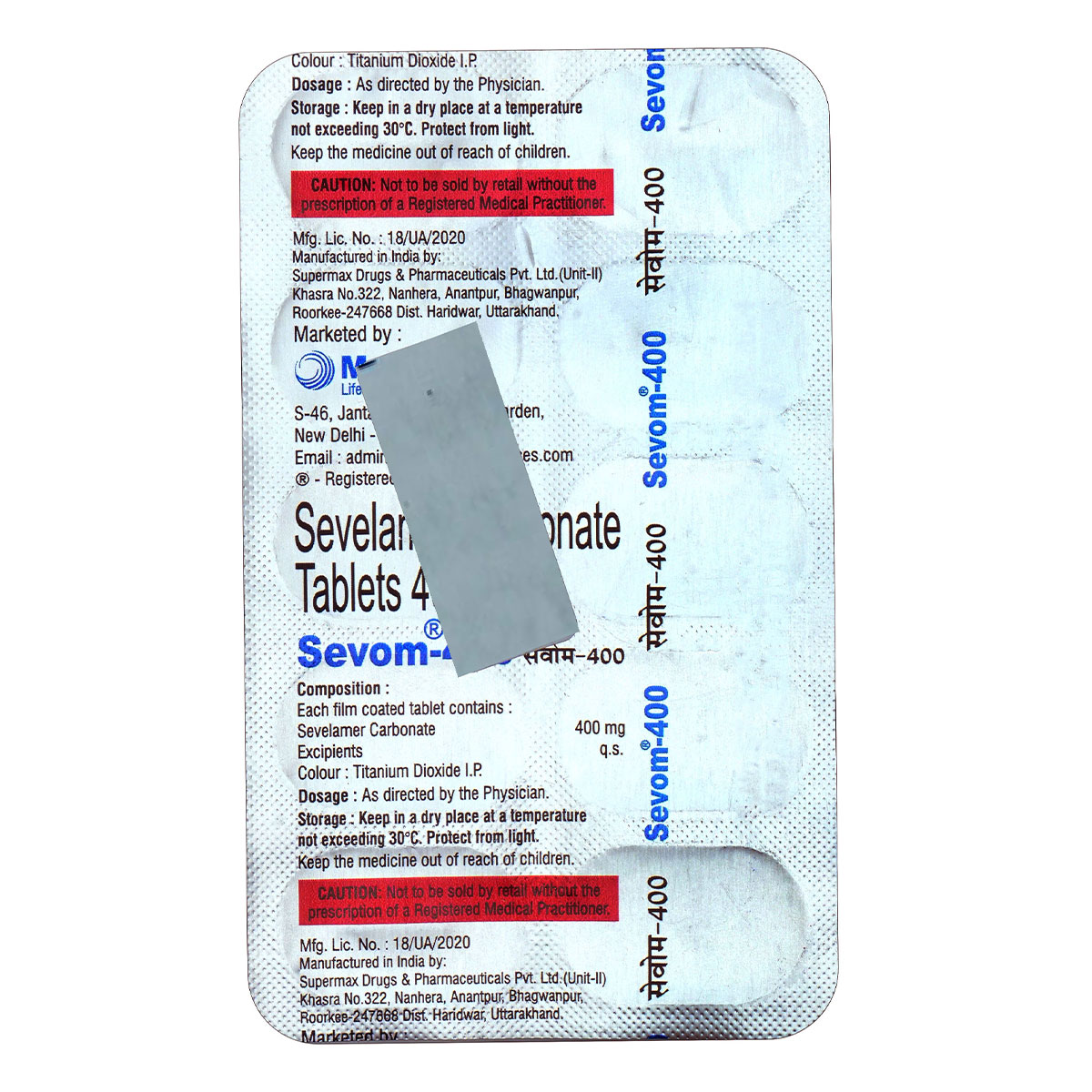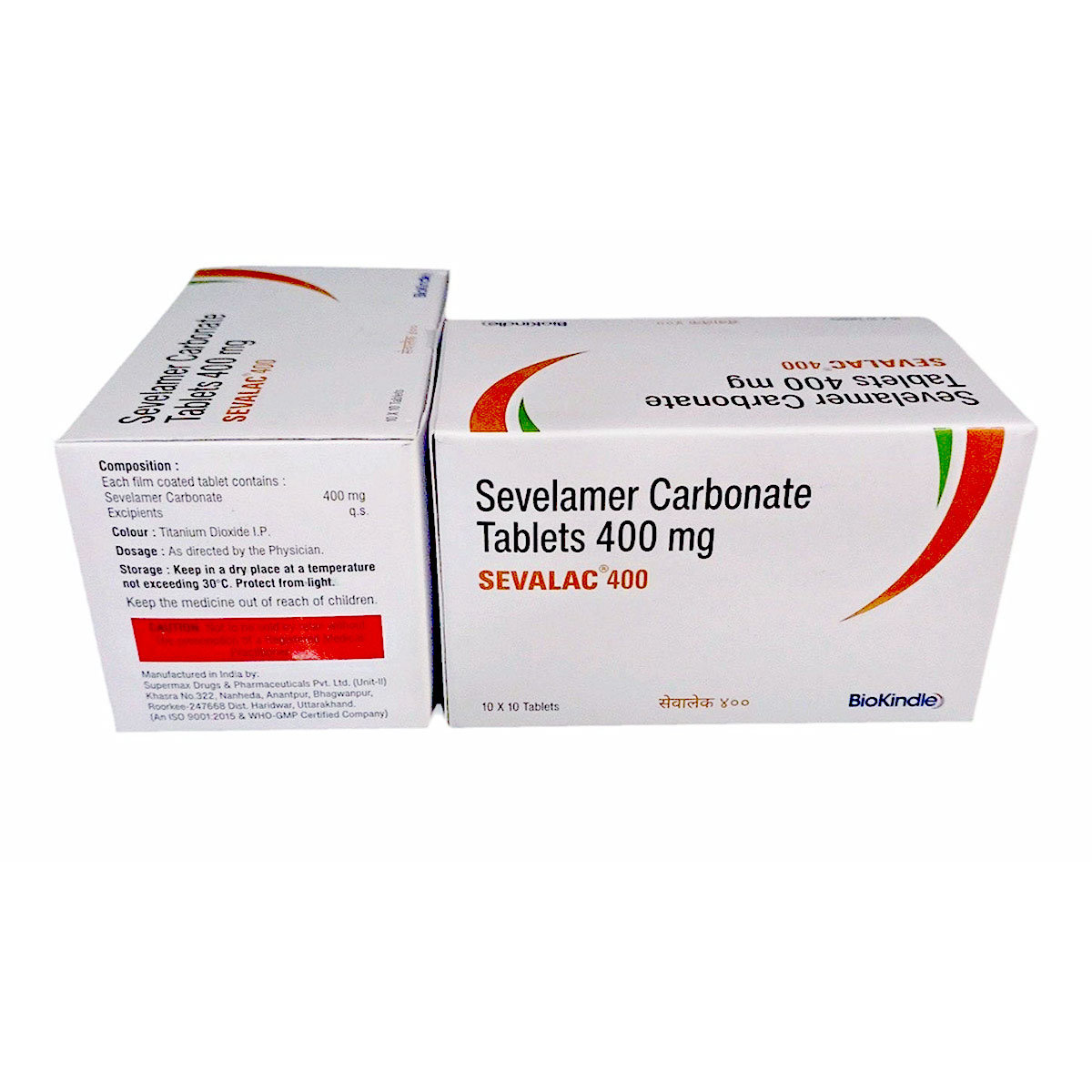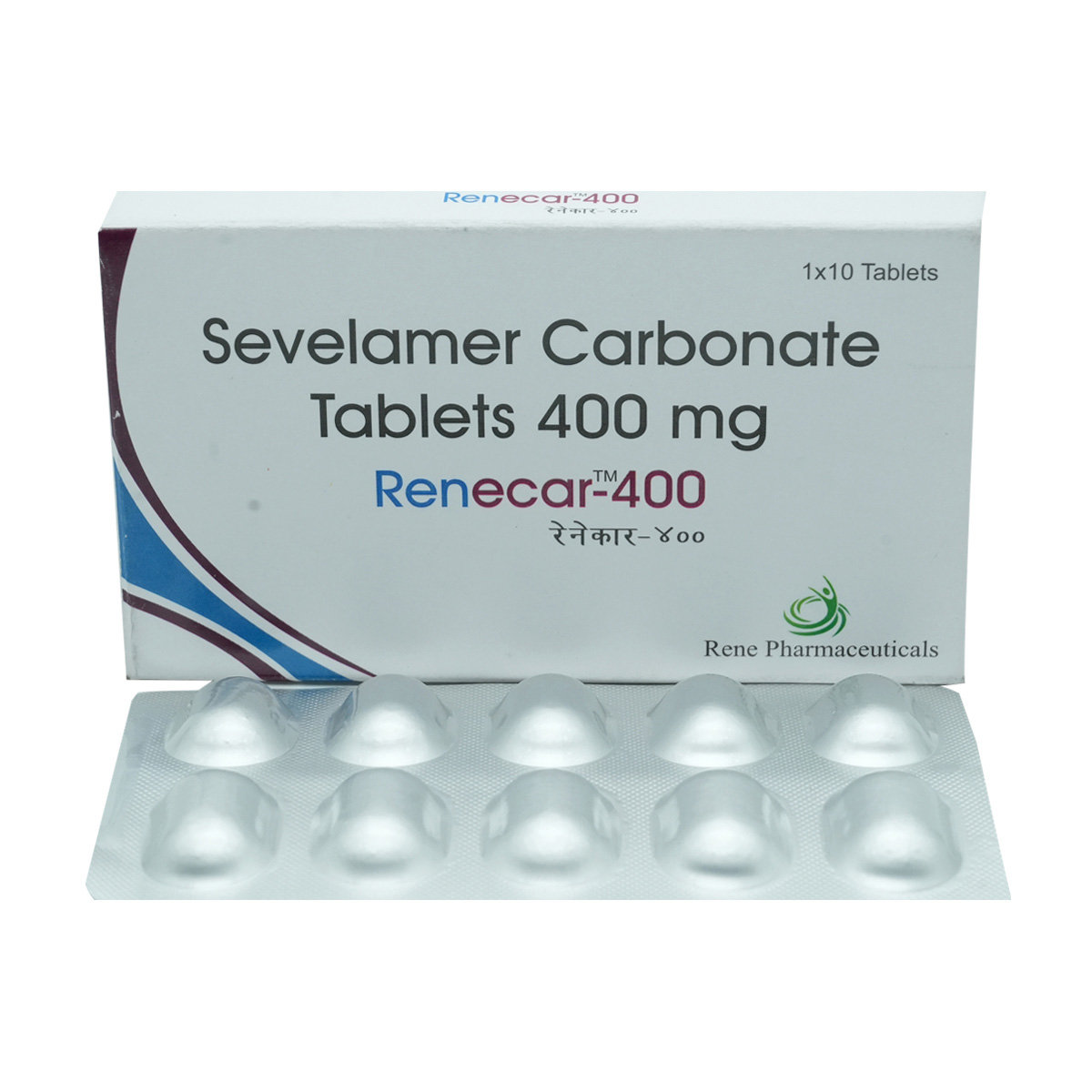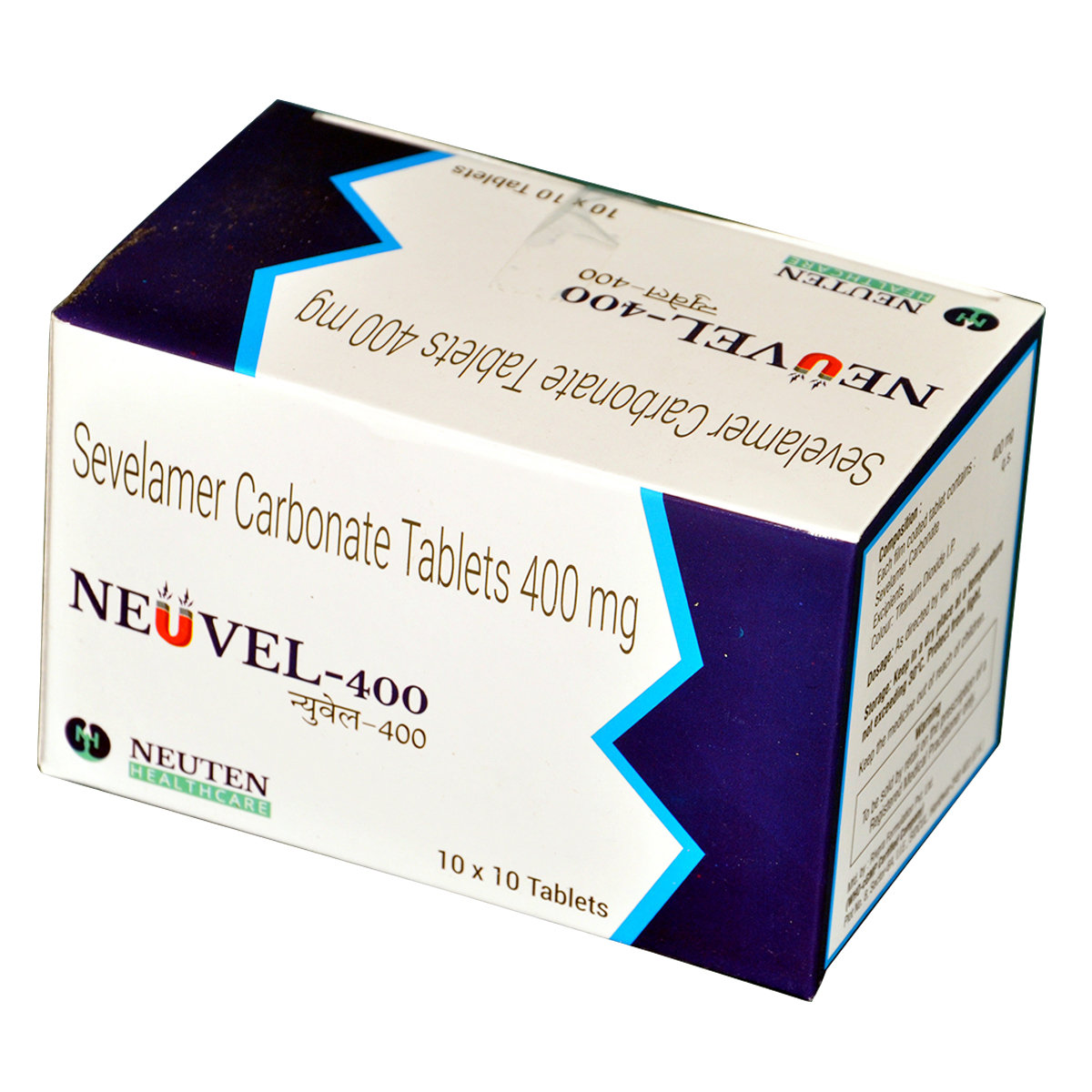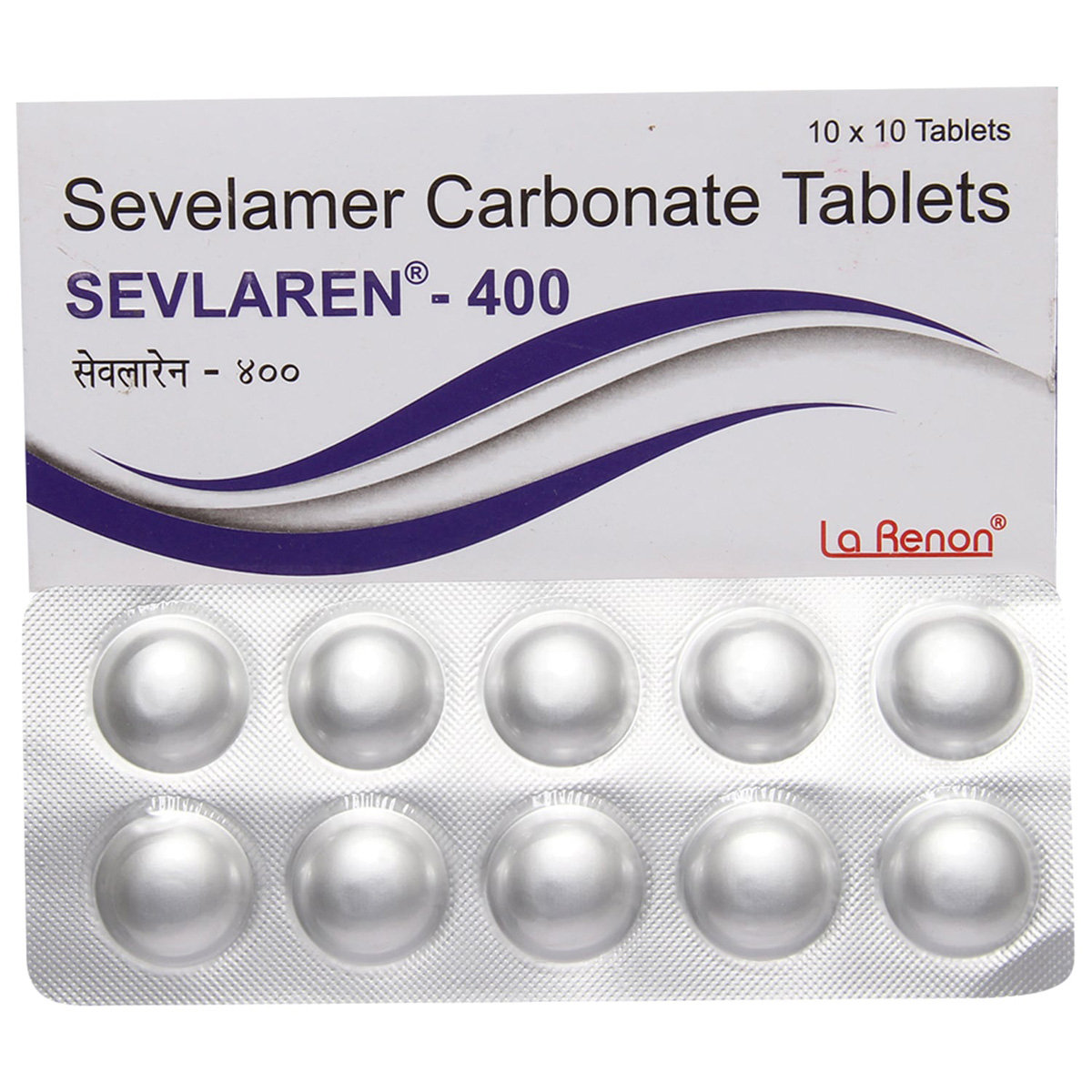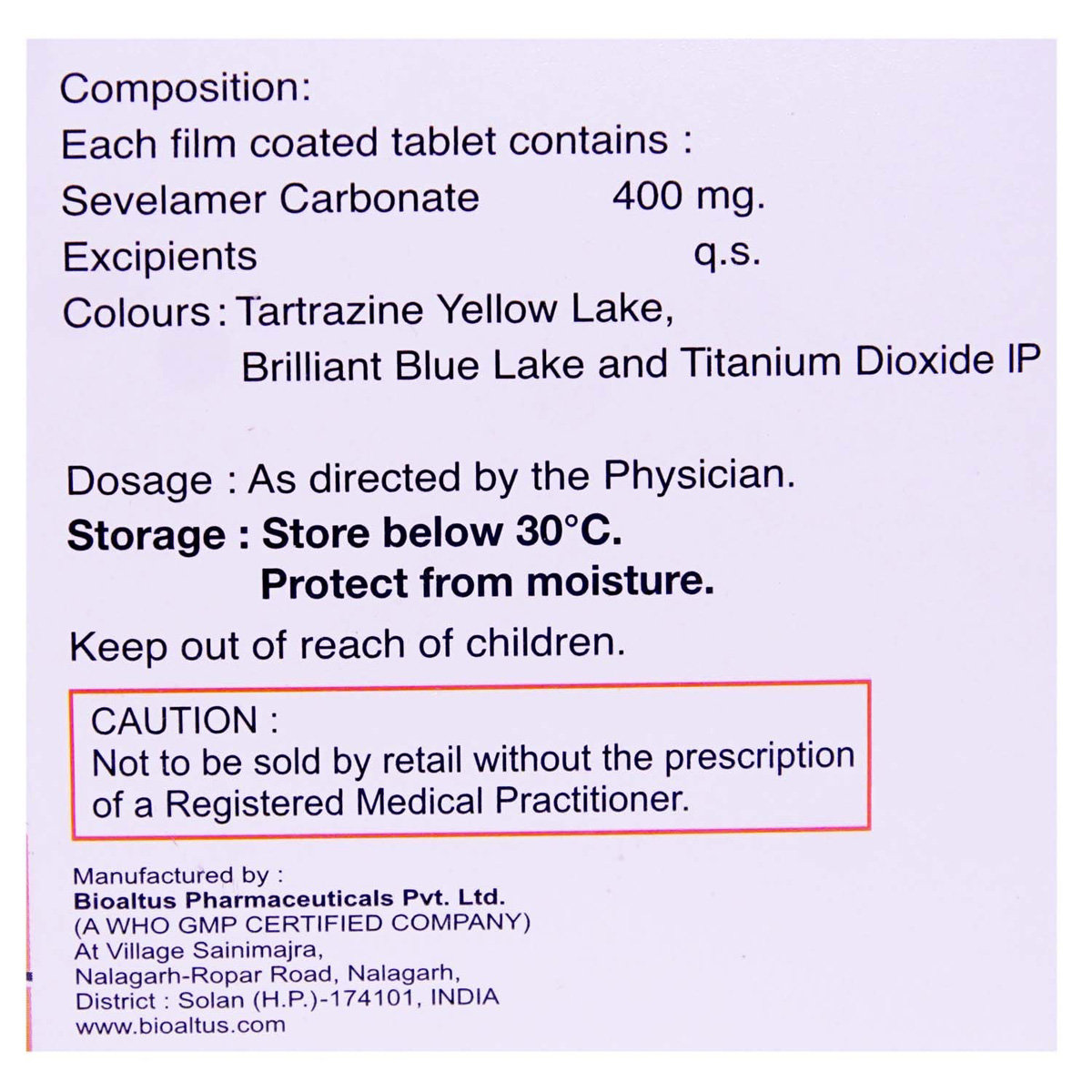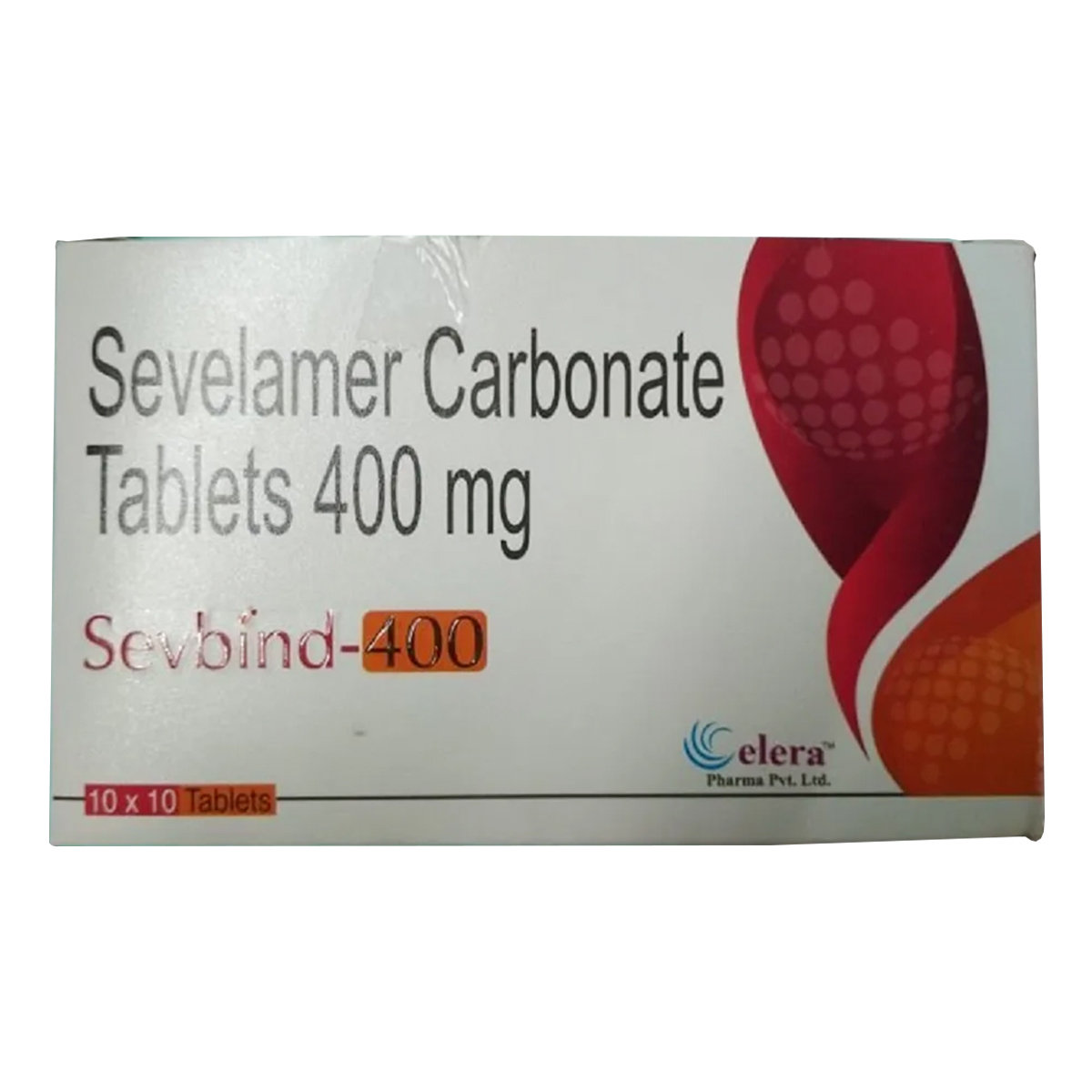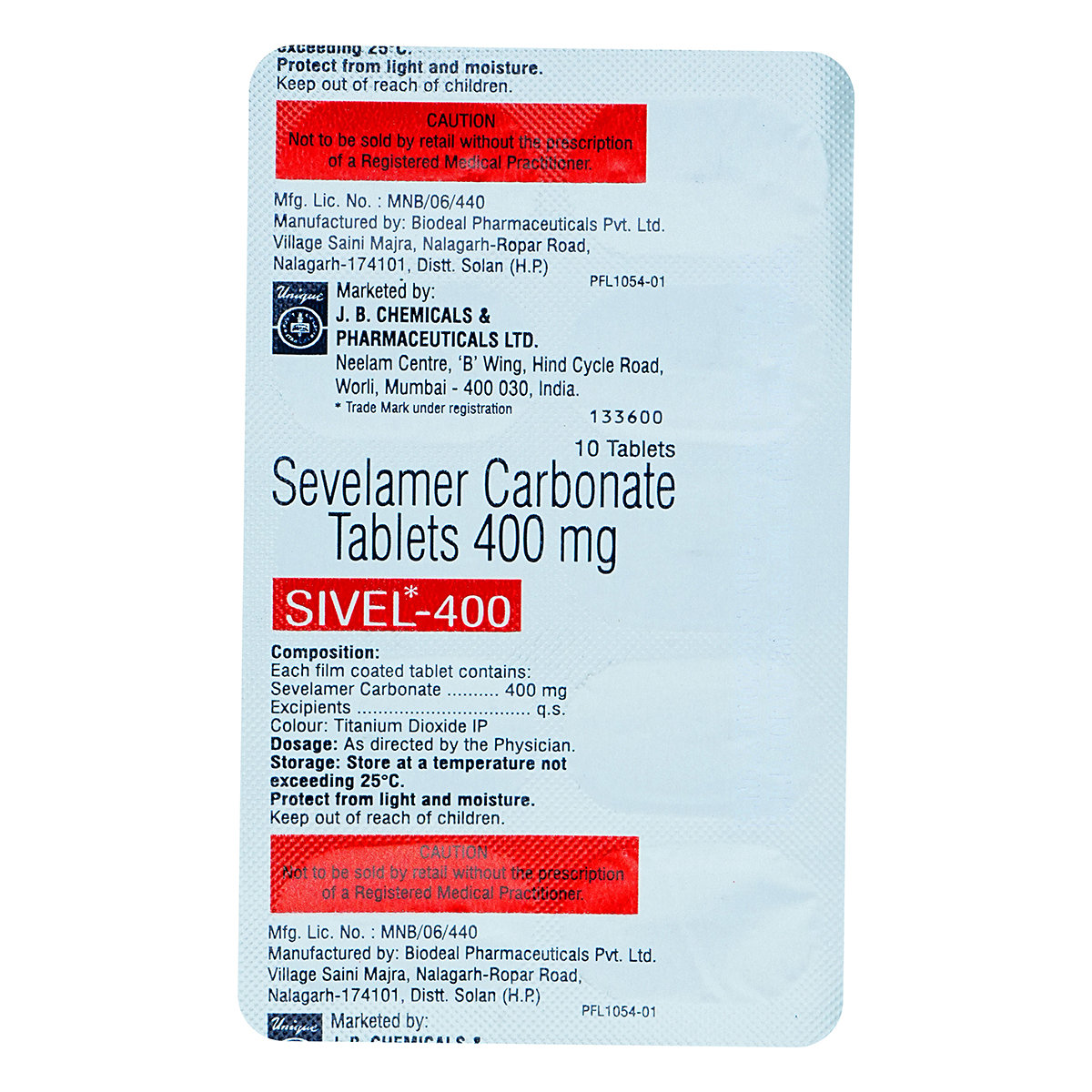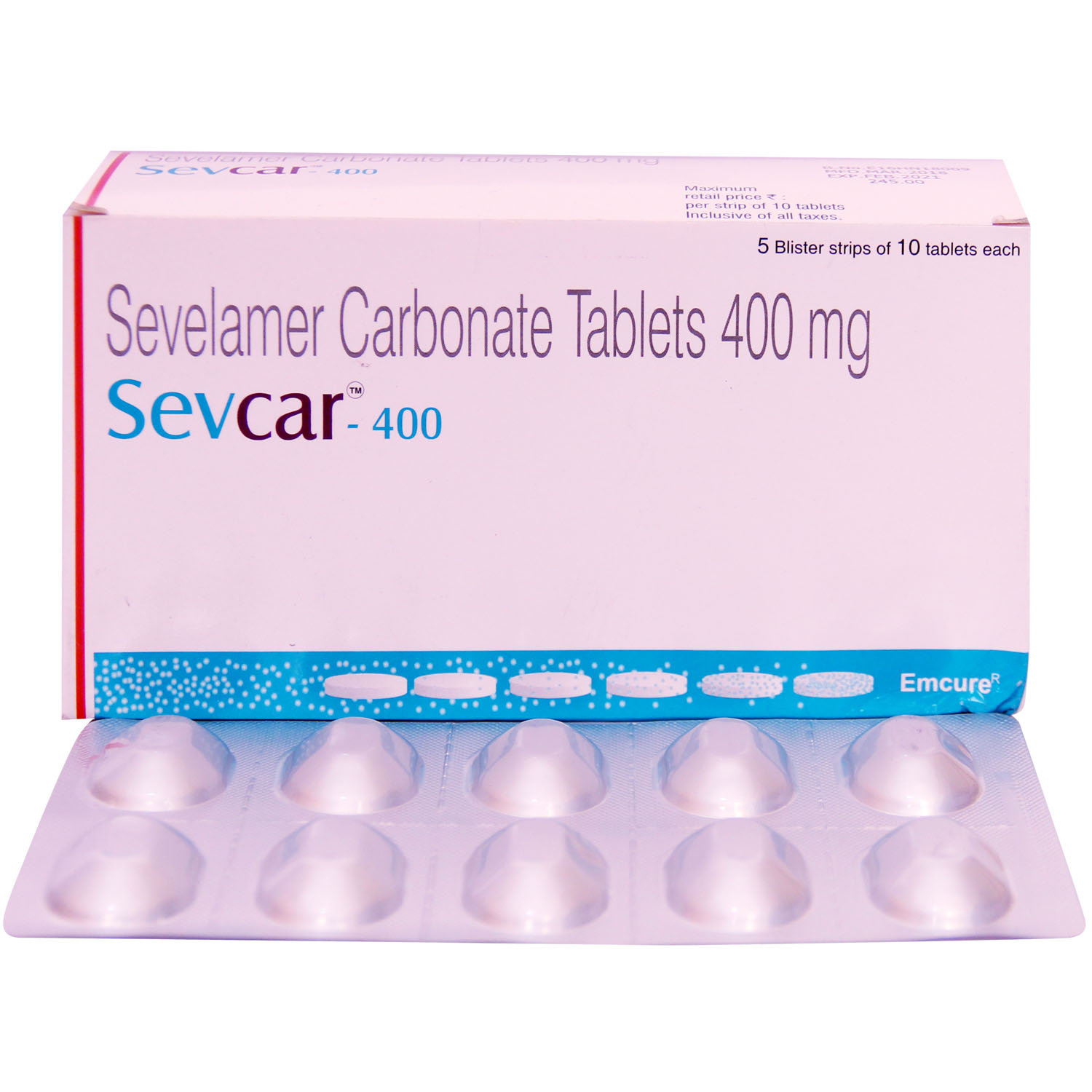Acosev 400mg Tablet
MRP ₹230
(Inclusive of all Taxes)
₹34.5 Cashback (15%)
Provide Delivery Location
Online payment accepted
 Prescription drug
Prescription drugWhats That
About Acosev 400mg Tablet
Acosev 400mg Tablet belongs to a group of medications called phosphate binder (which decreases the level of phosphate in the body). It is primarily used to control high phosphate levels in the body (hyperphosphataemia) in adult patients on dialysis (a blood clearance technique), patients undergoing hemodialysis (using a blood filtration machine), and patients with chronic kidney disease. It is also used for the treatment of bone disease.
Acosev 400mg Tablet contains sevelamer that works by binding phosphate in the gastrointestinal tract and decreasing absorption. It effectively reduces excess phosphate levels in the blood, prevents the unsafe build-up of phosphate in your body, helps keep your bones strong, and decreases the risk of heart disease and strokes.
Take Acosev 400mg Tablet exactly as directed by your doctor. The most common side effects of Acosev 400mg Tablet are vomiting, upper abdominal pain, nausea, diarrhoea, stomach ache, indigestion, and flatulence. However, if the side effects persist, contact your doctor.
The use of Acosev 400mg Tablet is restricted in persons with a known history of allergic to any of the ingredients present in this medicine, have low levels of phosphate in their blood, and have a bowel obstruction. Acosev 400mg Tablet contains lactose (milk sugar). If you have an intolerance to some sugars, contact your doctor before taking Acosev 400mg Tablet. Tell your doctor if you are facing swallowing problems, motility (movement) in your stomach and bowel, being sick frequently, active inflammation of the bowel, have undergone major surgery on your stomach or bowel, or have serious inflammatory bowel disease. If you are pregnant or breastfeeding, please consult your doctor before taking Acosev 400mg Tablet.
Uses of Acosev 400mg Tablet
Directions for Use
Key Benefits
Acosev 400mg Tablet belongs to a group of medications called phosphate binder, which works by binding phosphate in the gastrointestinal tract and decreasing its absorption. This lowers the phosphate concentration in the body. It effectively reduces excess phosphate levels in the blood, prevents the unsafe buildup of phosphate in your body, helps keep your bones strong, and decreases the risk of heart disease and strokes. Acosev 400mg Tablet controls hyperphosphataemia (high blood phosphate levels) in adult patients on dialysis (a blood clearance technique), patients undergoing hemodialysis (using a blood filtration machine) or peritoneal dialysis (where the fluid is pumped into the abdomen and an internal body membrane filters the blood), and patients with chronic kidney disease.
Storage
- Preventing Vomiting (Before it Happens)
- Take medication exactly as prescribed by your doctor. This can help minimize side effects, including vomiting.
- Having a small meal before taking your medication can help reduce nausea and vomiting.
- Talk to your doctor about taking anti-nausea medication along with your prescribed medication.
- Managing Vomiting (If it Happens)
- Try taking ginger in the form of tea, ale, or candy to help alleviate nausea and vomiting.
- What to Do if Vomiting Persists
- Consult your doctor if vomiting continues or worsens, consult the doctor for guidance on adjusting your medication or additional treatment.
- Inform your doctor about the nausea and discuss possible alternatives to the medication or adjustments to the dosage.
- Divide your daily food intake into smaller, more frequent meals to reduce nausea.
- Opt for bland, easily digestible foods like crackers, toast, plain rice, bananas, and applesauce.
- Avoid certain foods that can trigger nausea, such as fatty, greasy, spicy, and smelly foods.
- Drink plenty of fluids, such as water, clear broth, or electrolyte-rich beverages like coconut water or sports drinks.
- Use ginger (tea, ale, or candies) to help relieve nausea.
- Get adequate rest and also avoid strenuous activities that can worsen nausea.
- Talk to your doctor about taking anti-nausea medication if your nausea is severe.
- Record when your nausea occurs, what triggers it, and what provides relief to help you identify patterns and manage your symptoms more effectively.
- Inform Your Doctor: Notify your doctor immediately about your diarrhoea symptoms. This allows them to adjust your medication or provide guidance on managing side effects.
- Stay Hydrated: Drink plenty of fluids to replace lost water and electrolytes. Choose water, clear broth, and electrolyte-rich drinks. Avoid carbonated or caffeinated beverages to effectively rehydrate your body.
- Follow a Bland Diet: Eat easy-to-digest foods to help firm up your stool and settle your stomach. Try incorporating bananas, rice, applesauce, toast, plain crackers, and boiled vegetables into your diet.
- Avoid Trigger Foods: Steer clear of foods that can worsen diarrhoea, such as spicy, fatty, or greasy foods, high-fibre foods, and dairy products (especially if you're lactose intolerant).
- Practice Good Hygiene: Maintain good hygiene to prevent the spread of infection. To stay healthy, wash your hands frequently, clean and disinfect surfaces regularly, and avoid exchanging personal belongings with others.
- Take Anti-Diarrheal Medications: If your doctor advises, anti-diarrheal medications such as loperamide might help manage diarrhoea symptoms. Always follow your doctor's directions.
- Keep track of your diarrhoea symptoms. If they don't get better or worse or are accompanied by severe stomach pain, blood, or dehydration signs (like extreme thirst or dark urine), seek medical help.
- Report the itching to your doctor immediately; they may need to change your medication or dosage.
- Use a cool, damp cloth on the itchy area to help soothe and calm the skin, reducing itching and inflammation.
- Keep your skin hydrated and healthy with gentle, fragrance-free moisturizers.
- Try not to scratch, as this can worsen the itching and irritate your skin.
- If your doctor prescribes, you can take oral medications or apply topical creams or ointments to help relieve itching.
- Track your itching symptoms and follow your doctor's guidance to adjust your treatment plan if needed. If the itching persists, consult your doctor for further advice.
- Please inform your doctor about joint pain symptoms, as they may adjust your medication regimen or prescribe additional medications to manage symptoms.
- Your doctor may prescribe common pain relievers if necessary to treat joint discomfort.
- Maintaining a healthy lifestyle is key to relieving joint discomfort. Regular exercise, such as low-impact sports like walking, cycling, or swimming, should be combined with a well-balanced diet. Aim for 7-8 hours of sleep per night to assist your body in repairing and rebuilding tissue.
- Applying heat or cold packs to the affected joint can help reduce pain and inflammation.
- Please track when joint pain occurs and any factors that may trigger it, and share this information with your doctor to help manage symptoms.
- If your joint pain is severe or prolonged, consult a doctor to rule out any underlying disorders that may require treatment.
- If you experience symptoms like coughing, wheezing, chest tightness, or difficulty breathing after taking medication, seek medical attention immediately.
- Your healthcare provider will work with you to stop the medication causing the reaction, start alternative treatments, and provide supportive therapy.
- To manage symptoms and prevent complications, follow your doctor's advice to use inhalers or nebulizers as prescribed, practice good hygiene, avoid irritants, stay hydrated, and get plenty of rest.
- Regularly track your symptoms and report any changes or concerns to your healthcare provider.
- Tell your doctor immediately if you experience shortness of breath after taking medication.
- Your doctor may adjust the medication regimen or dosage or give alternative medical procedures to minimize the symptoms of shortness of breath.
- Monitor your oxygen levels and breathing rate regularly to track changes and potential side effects.
- For controlling stress and anxiety, try relaxation techniques like deep breathing exercises, meditation, or yoga.
- Make lifestyle changes, such as quitting smoking, exercising regularly, and maintaining a healthy weight.
- Seek emergency medical attention if you experience severe shortness of breath, chest pain, or difficulty speaking.
- Follow up regularly with your doctor to monitor progress, adjust treatment plans, and address any concerns or questions.
Drug Warnings
You should avoid taking Acosev 400mg Tablet if you are allergic to Acosev 400mg Tablet. Speak to your doctor if you have swallowing disorders, digestive tract surgery, severe constipation, have undergone major surgery on your stomach or bowel, or have serious inflammatory bowel disease. It should be used with caution if you are pregnant or planning to become pregnant. Acosev 400mg Tablet should not be recommended for breastfeeding mothers as it passes into breast milk. Avoid alcohol consumption while taking Acosev 400mg Tablet as it might cause unpleasant side effects. The safety and effectiveness of children under six years of age have not been established, so a Acosev 400mg Tablet should not be given to them. Acosev 400mg Tablet contains lactose (milk sugar). If you have an intolerance to some sugars, contact your doctor before taking Acosev 400mg Tablet. Regular monitoring of serum phosphate levels, vitamin D, A, E, K, and folic acid is advised while taking Acosev 400mg Tablet.
Drug-Drug Interactions
Drug-Drug Interactions
Login/Sign Up
Co-administration of Enoxacin and Acosev 400mg Tablet can decrease the blood levels and effectiveness of Enoxacin.
How to manage the interaction:
Co-administration of Enoxacin and Acosev 400mg Tablet can lead to an interaction, but it can be taken if advised by your doctor. Do not stop using any medications without a doctor's advice.
Gemifloxacin's efficiency can be decreased by Acosev 400mg Tablet if it prevents the drug from being absorbed into the bloodstream. this is caused by the combined use of gemifloxacin and Acosev 400mg Tablet.
How to manage the interaction:
Co-administration of enoxacin and Acosev 400mg Tablet can lead to an interaction, but it can be taken if your doctor advises. It has been advised to separate the dosing of these medications by at least 4 hours and consult the doctor if your symptoms do not improve. Do not stop using any medications without a doctor's advice.
Co-administration of Acosev 400mg Tablet with Ergocalciferol can decrease the effects of Ergocalciferol.
How to manage the interaction:
Co-administration of Acosev 400mg Tablet with Ergocalciferol can lead to an interaction, but they can be taken if advised by your doctor. Consult the doctor if your symptoms worsen. Do not stop using any drugs without a doctor's advice.
Drug-Food Interactions
Drug-Food Interactions
Login/Sign Up
Diet & Lifestyle Advise
- Take fresh fruits, vegetables, rice, milk, un-enriched corn and rice cereals, and soda without phosphate additives in your regular diet.
- Avoid or limit high phosphorus addictive foods (processed meats, instant puddings, sauces, spreadable cheeses, and beverage products).
- Avoid intake of alcoholic beverages with Acosev 400mg Tablet as it can make you dehydrated and may increase the side effects.
- Make sure you drink plenty of fluids. This will help you clear out the extra phosphate and will help you overcome some.
- Acosev 400mg Tablet is preferably taken with meals as it can bind to dietary phosphate and prevent its absorption into the bloodstream. Drink it with a full glass of water.
- Do not stop taking the Acosev 400mg Tablet dose until your doctor says so.
- Do not use Acosev 400mg Tablet if you have a history of bowel obstruction.
Side Effects of Acosev 400mg Tablet
- Headache
- Diarrhoea
- Stomach upset
- Constipation
Habit Forming
Therapeutic Class
All Substitutes & Brand Comparisons
RX
Phoscut 400 Tablet 10's
Steadfast MediShield Pvt Ltd
₹90
(₹8.1 per unit)
60% CHEAPERRX
Revlamer 400 Tablet 10's
Sun Pharmaceutical Industries Ltd
₹120
(₹10.8 per unit)
47% CHEAPERRX
Acutrol C 400 Tablet 15's
Intas Pharmaceuticals Ltd
₹181.5
(₹10.89 per unit)
47% CHEAPER
Author Details
We provide you with authentic, trustworthy and relevant information
Drug-Diseases Interactions
Drug-Diseases Interactions
Login/Sign Up
FAQs
Drug-Drug Interactions Checker List
- CIPROFLOXACIN
- MYCOPHENOLATE SODIUM
- LEVOTHYROXINE SODIUM
- ERDAFITINIB
Special Advise
- Regular monitoring of serum phosphate levels, vitamin D, A, E, K, and folic acid is recommended while taking Acosev 400mg Tablet.
Disease/Condition Glossary
Hyperphosphatemia: Hyperphosphatemia is defined as an increased phosphate level in the blood. This condition is often a complication of chronic kidney disease. Phosphate is an important electrolyte. It strengthens your bones and teeth and produces energy. When phosphate levels increase in the blood due to kidney impairment (the kidney does not remove extra phosphate out of the body), this can cause muscle problems and increase the risk of weak bones, heart attacks, and strokes. It is more common in people with chronic kidney disease and people on dialysis. Symptoms may include itchy skin, red eyes, bone pain, and fractures.

Have a query?
Alcohol
Safe if prescribed
You are recommended to avoid alcohol consumption while taking Acosev 400mg Tablet to avoid unpleasant side effects.
Pregnancy
Consult your doctor
Acosev 400mg Tablet is Category C pregnancy medicine. Please consult your doctor if you have any concerns; your doctor will prescribe you Acosev 400mg Tablet only if the benefits outweigh the risks.
Breast Feeding
Consult your doctor
The safety of Acosev 400mg Tablet has not been established in breastfeeding women. Please consult your doctor if you have any concerns regarding this; your doctor will decide whether the Acosev 400mg Tablet can be given to breastfeeding mothers or not.
Driving
Safe if prescribed
Acosev 400mg Tablet has no or negligible influence on the ability to drive or operate any machinery.
Liver
Consult your doctor
Acosev 400mg Tablet should be used with caution in patients with liver impairment/liver disease. Please consult your doctor if you have a liver impairment or any concerns regarding this.
Kidney
Consult your doctor
Dose adjustment may be needed. Acosev 400mg Tablet should be used with caution in patients with kidney impairment/kidney disease. Please consult your doctor if you have kidney impairment or any concerns regarding this.
Children
Safe if prescribed
For children, SEVELAMER is available in pouches for oral suspension. Please consult your paediatrician for further information. The paediatrician will decide the dose of this medicine.




